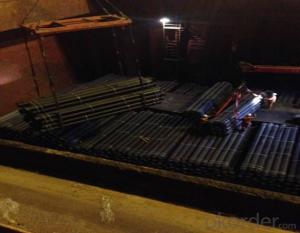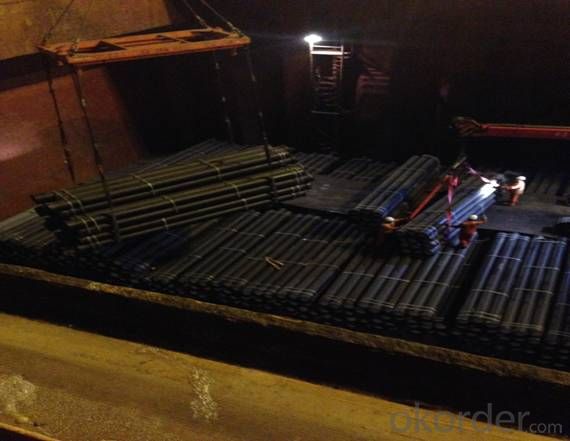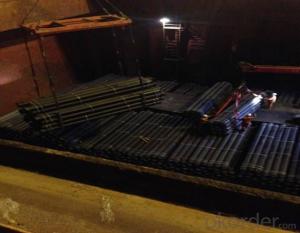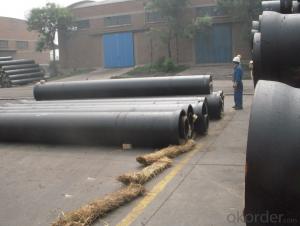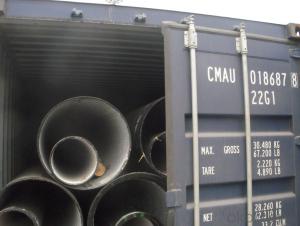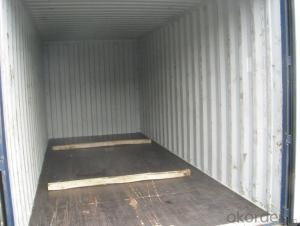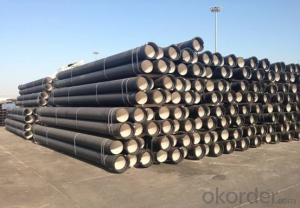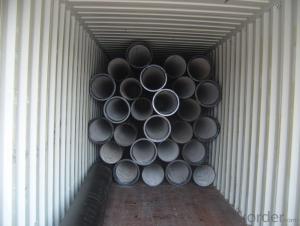DUCTILE IRON PIPES K8 DN1200
- Loading Port:
- China Main Port
- Payment Terms:
- TT OR LC
- Min Order Qty:
- -
- Supply Capability:
- -
OKorder Service Pledge
OKorder Financial Service
You Might Also Like
Ductile Iron Cast Pipe is without any defects compare with tradition casting tech, which has many advantages particularly as follow:
(1) High density. In the "vertical upward casting" process, the melt iron of centre liquid column in center crystallizer is continuously feeding for volume shrinkage caused by condensation tube at outer circumference , which lead to be free of shrinkage porosity.
(2) High purity. When melt iron pouring, the mixed impurities such as gas, dross, sand grain which are lighter than melt iron could be eliminated at furnace mouth, its impossible to enter into the crystallizer through the channel, so the melt iron into the crystallizer is very pure.
(3) Strength with toughness. The cooling speed provided by continuous crystallizer is 30 times than sand casting and 5 times than centrifugal casting, and doesn't produce white iron, the eutectic cell volume of continuous cast iron is one eighth to one tenth compare with traditional cast iron. The density of graphite nodule in ductile iron can reach 300-700 pcs/mm2. Therefore, all reason above improve the strength and toughness of continuous cast iron.
(4) Free machining. The high speed cooling make the hardening phase (such as boride, steadite) not appear like reticular, massive or thick, but diffuse like fish bone and pane in shape, moreover, there are tiny graphite flakes inlaid hardening phase. It's free machining in BrinellHardness the range of 250-300HB. However, the Brinell Hardness of 250 is top limit to common metal materials.
(5) Uniform composition of tube wall. The convection mixing of liquid column caused by marching type drawing in crystallizer make the composition of tube wall well-distributed, and concentration gradient very little.
(6) High productivity. To the wall thickness of tube under 10mm, the speed of continuous casting is 1 meter/min, to the wall thickness of tube under 20mm, the speed of continuous casting is 0.5 meter/min, which is high efficiency that centrifugal or other casting tech couldn't reach.
- Q: Are ductile iron pipes resistant to abrasion?
- Yes, ductile iron pipes are highly resistant to abrasion.
- Q: What are the environmental benefits of using ductile iron pipe?
- Ductile iron pipe offers several environmental benefits. Firstly, it is made from recycled materials, reducing the need for extracting new resources. Secondly, it has a long lifespan, typically lasting over 100 years, reducing the need for frequent replacements and minimizing waste. Additionally, ductile iron pipes have a low carbon footprint compared to other materials, contributing to lower greenhouse gas emissions. Lastly, these pipes have excellent corrosion resistance, reducing the risk of leaks and contamination of water sources, thus protecting the environment.
- Q: Can ductile iron pipes be used in acidic environments?
- Yes, ductile iron pipes can be used in acidic environments. Ductile iron pipes have a high resistance to corrosion, making them suitable for various applications including acidic environments. The high carbon content in ductile iron pipes creates a protective layer on the surface of the pipe, preventing the acid from directly attacking the iron. Additionally, the inner lining of the pipe can be coated with epoxy or other protective materials to further enhance its resistance to corrosion in acidic conditions. However, it is important to consider the specific concentration and type of acid present in the environment, as certain acids may still cause corrosion over time. Consulting with experts or manufacturers is recommended to ensure appropriate material selection for specific acidic environments.
- Q: Do ductile iron pipes require internal linings or coatings?
- Yes, ductile iron pipes typically require internal linings or coatings in order to prevent corrosion and extend their lifespan.
- Q: How does ductile iron pipe perform in areas with high water hammer?
- Ductile iron pipe performs well in areas with high water hammer due to its inherent strength and flexibility. Its ability to absorb and dissipate the energy generated by water hammer helps to prevent pipe failures and minimize the damaging effects of pressure surges. This makes ductile iron pipe a reliable choice for water distribution systems in such areas.
- Q: How does ductile iron pipe perform in sandy or unstable soils?
- Due to its inherent strength and flexibility, ductile iron pipe exhibits exceptional performance in sandy or unstable soils. Its composition, which includes a combination of iron, carbon, and small amounts of other elements, grants it superior mechanical properties compared to other pipe types. In sandy soils, where the ground may shift and cause pipe movement and deformation, ductile iron's high tensile strength and elongation characteristics enable it to withstand pressure and stress without fracturing or breaking. Its flexibility allows it to accommodate soil movement and settlement, reducing the risk of pipe failure. Furthermore, ductile iron pipe's resistance to corrosion makes it highly suitable for installation in sandy soils. The application of protective linings and coatings on both the interior and exterior of the pipe prevents corrosive elements in the soil from attacking the iron, ensuring durability and reliability in the long term. In unstable soils with varying compaction levels or weak load-bearing capacity, ductile iron pipe's sturdy construction provides stability and support. Its robustness allows for even distribution of loads, minimizing the chances of pipe deflection or collapse. Moreover, the joint design and sealing methods of ductile iron pipe, such as push-on joints or mechanical joints with rubber gaskets, offer excellent leak resistance and prevent soil infiltration. This further enhances its performance in sandy or unstable soils. Overall, the combination of strength, flexibility, corrosion resistance, and reliable joint systems makes ductile iron pipe an ideal choice for applications in sandy or unstable soils. It provides a long-lasting and efficient solution for the transmission of water and wastewater.
- Q: Can ductile iron pipes be used in underground installations?
- Yes, ductile iron pipes can be used in underground installations. Ductile iron is a strong and durable material that is often used for underground piping systems due to its resistance to corrosion, high-pressure capacity, and ability to withstand external forces. It is commonly used in various applications such as water and sewage systems, gas pipelines, and industrial installations.
- Q: Can ductile iron pipe be recycled?
- Yes, ductile iron pipe can be recycled. It is a highly recyclable material that can be melted down and reused in the production of new ductile iron products. Recycling ductile iron pipe helps reduce waste and conserves natural resources.
- Q: Ductile iron pipe joint leakage
- After cleaning the pipe mouth, the cf-2000 high efficiency composite waterproof agent is used to seal it, and it will not leak.
- Q: Are ductile iron pipes compatible with other pipe materials?
- Yes, ductile iron pipes are compatible with other pipe materials. They can be connected to pipes made of various materials such as PVC, HDPE, steel, and more, using appropriate fittings and connectors.
Send your message to us
DUCTILE IRON PIPES K8 DN1200
- Loading Port:
- China Main Port
- Payment Terms:
- TT OR LC
- Min Order Qty:
- -
- Supply Capability:
- -
OKorder Service Pledge
OKorder Financial Service
Similar products
Hot products
Hot Searches
Related keywords
